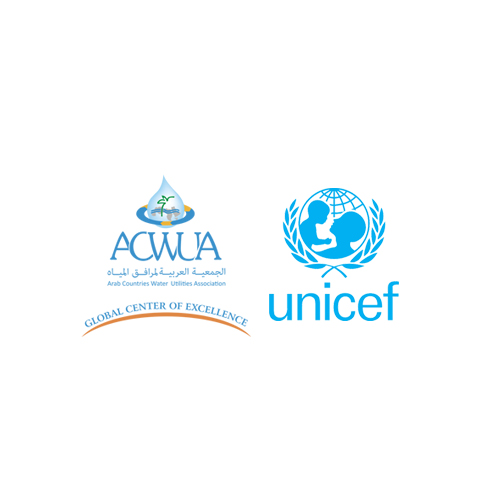Overview of the Action
-The Ministry of Water and Irrigation (MWI) is committed to the institutionalization of Climate Resilient Water and Sanitation Safety and Security Planning (CR-WSSSP) as a cornerstone of its
national water strategy. Recognizing the urgency imposed by climate change and water scarcity, UNICEF Jordan, through ACWUA, is supporting MWI’s aims to embed CR-WSSSP into its
organizational structure and operational protocols. This institutionalization is not merely an add-on but a fundamental reorientation that aligns with global frameworks like the Sendai Framework for
Disaster Risk Reduction and supports the achievement of multiple Sustainable Development Goals (SDGs).
-Moreover, during this project ACWUA is assessing UNICEF performance in the refugees’ camps particularly: Zaatari and Azraq regarding the water and wastewater constructed systems and adopted techniques and best practices.
Objectives of the action
Activity One Objective: CR-WSSSP Institutionalization
Institutional Strengthening and Policy Support
Support the development, update, and implementation of national frameworks for climate resilient WASH services at household and institutional level, and the integration of the humanitarian / development and water/food energy nexus.
Activity Two Objective: Comprehensive Operations Management Analysis and Review in Azraq and Zaatari Refugee Camps
Institutional Strengthening and Policy Support
Undertake program improvement activities (baseline, midterm, end-line surveys, and evaluations) to assess and improve program implementation and response to priorities.
Results of the action (Outcomes & outputs)
Activity One: CR-WSSSP Institutionalization
- Regulatory Alignment: The first step in this strategic approach is aligning CR-WSSSP with existing regulations and policies. This involves a comprehensive review of current laws and guidelines to identify gaps and opportunities for integration.
- Stakeholder Engagement: A multi-disciplinary task force comprising representatives from relevant departments within MWI, other government agencies, and external experts will be formed. This task force is instrumental in shaping the CR-WSSSP framework and ensuring its relevance and applicability.
- Departmental Integration: A dedicated department or unit for CR-WSSSP is established within MWI. This department will serve as the nerve center for all CR-WSSSP activities, from planning and implementation to monitoring and evaluation.
- Capacity Building: Internal capacity through targeted training programs, workshops, and knowledge-sharing sessions to ensure that MWI staff at all levels are equipped with the skills and knowledge required to implement CR-WSSSP effectively.
- Pilot Testing: Before a full-scale rollout, pilot projects is initiated in select regions to test the feasibility and effectiveness of the CR-WSSSP framework. Lessons learned from these pilots inform the national rollout.
- Monitoring and Feedback Mechanisms: Robust monitoring and evaluation frameworks put in place to track the progress of CR-WSSSP institutionalization. Regular audits and reviews are conducted, and feedback loops are established for continuous improvement through IT-Solutions.
Activity Two: Comprehensive Operations Management Analysis and Review in Azraq and Zaatari Refugee Camps
- Desk Reviewing of UNICEF’s Operational Documents: Review and compile existing strategies, SoPs, and guidelines from the UNICEF system.
- Analysing of Water and Wastewater Systems: Analyse existing documents and operational schemas in the refugee camps.
- Field Missions for Verification and Validation: Conduct field missions to validate the current state of operations in the camps.
- Stakeholders Consultation Workshops: Organize workshops to engage stakeholders in the consultation process.
- Current Situation Evaluation in the Camps: Evaluate the existing situation in the camps against SoPs, guidelines, and strategies.
- Best Practices Scenarios Development: Develop and document best practices scenarios for water and wastewater management.”
- Costed Improvement Plan Development: Develop a plan highlighting recommendations and associated costs based on scenario analysis.
- Report Compilation: Compile a final report detailing the project’s findings and proposed improvement strategies.
Activity Three: Operationalization Plan for the National WASH and IPC in Healthcare Facilities in Jordan
- Detailed Action Plan Development: Formulate specific tasks aligned with the program’s strategic objectives, detailing the execution timeline, milestones, and resource allocation for infrastructure upgrades, training programs, and hygiene promotion campaigns.
- Funding and Capacity Assessment: Determine the financial resources and capacities necessary for each component, identifying and addressing any gaps in funding or capabilities.
- Economic Analysis: Conduct a thorough economic analysis of the action plan to assess cost-effectiveness, identify cost-saving opportunities, and ensure financial sustainability. This analysis will inform the development of a comprehensive fundraising plan.
- Gap Analysis and Bridging Strategies: Utilize assessments to identify resource, infrastructure, and skill gaps, developing strategies to address these effectively.
- Stakeholder Analysis and Engagement: Map and engage with stakeholders including healthcare workers, government agencies, and international partners, fostering collaboration and support. Map out potential donors, including international organizations, NGOs, and private sector entities, to understand their funding priorities and interests. Develop a targeted engagement strategy to foster collaboration and support.
- Funding Strategy: Identify potential funding sources and craft targeted proposals to secure the necessary resources from government budgets, international donors, and private sector contributions.
- Optimization of Internal Funding: Analyze the Ministry of Health’s current funding streams to identify underutilized resources that can be reallocated to support the WASH program.
- Exploration of PPP Opportunities: Identify areas within the WASH program conducive to public-private partnerships, outlining the benefits and frameworks necessary to attract private sector investment and expertise.
- Operational Plan Development: Integrate findings from the funding analysis, stakeholder engagement, PPP exploration, and economic analysis into a cohesive operational plan. This plan will detail the financial strategies, partnership models, and timelines necessary for the program’s successful implementation.
- Exploration of PPP Opportunities: Identify areas within the WASH program conducive to public-private partnerships, outlining the benefits and frameworks necessary to attract private sector investment and expertise.


